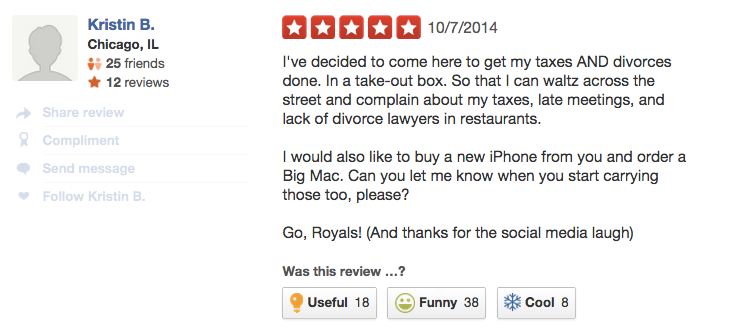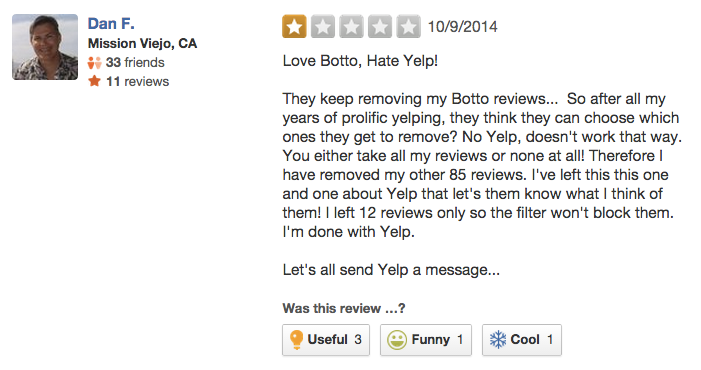 Court Ruling in Favor of Yelp is Terrible — for Yelp
Court Ruling in Favor of Yelp is Terrible — for Yelp
Feels like we’re on one of those anti-Yelp surges again.
By now, you’ve probably heard about a court case in which Yelp won against three small businesses. Let’s talk about that court case and then think constructively about what YOU can do about Yelp.
- Businesses Accusing Yelp of Extortion Lose Another Round in Court
- Court Says Yelp has the Right to Manipulate Reviews
- Court Rules for Yelp in Suit over Online Ratings
- Yelp Can Manipulate Ratings, Court Rules
A headline can’t tell the whole story, of course. I get it. And honestly these headlines are pretty slanted against Yelp to boot. But there’s still not a lot to like in this ruling for restaurants big and small. I don’t even think it’s that great for Yelp, either.
Sure, that recent court case suggests what Yelp has always told us — and I have no personal history or stories to refute this — that ads have no impact on reviews. Notice I said that ruling SUGGESTS what Yelp tells us about the lack of a correlation between ads and reviews. Because I will you tell you this, too, and it’s straight from the court ruling itself:
The court held that the small, mom-and-pop businesses “in this case failed sufficiently to allege that Yelp wrongfully threatened economic loss by manipulating user reviews.”
The court also asserted these two biggies:
“We conclude, first, that Yelp’s manipulation of user reviews, assuming it occurred, was not wrongful use of economic fear…”
“…it is not unlawful for Yelp to post and sequence the reviews…”
 “Businesses can’t pay to alter or remove their reviews.” Okay. But what’s not said there?
“Businesses can’t pay to alter or remove their reviews.” Okay. But what’s not said there?
Can businesses pay to re-order or re-sort their Yelp reviews? And what if they don’t pay for that? Take a second look at that screenshot above, or your own Yelp page for that matter, and you’ll see there are four sort options: Yelp Sort, Date, Rating, and Elites.
“Yelp Sort.” Yelp sort? Craziness.
Yelp can legally change the sort order in any manner they desire.
Why I think this is terrible for Yelp
This is ultimately terrible for Yelp. And I don’t even have an axe to grind with them.
Yelp’s not going away. But the more consumers read about, let alone notice, that Yelp can legally and will manipulate reviews, including re-sorting them to emphasize the negative ones, the more they’ll distrust the resource.
I don’t mean the more restaurants sense that. You guys have sensed that for a long time. I’m talking consumers. The more court cases like this, the more Yelp feels it can flex its muscles. The more Yelp flexes its muscles, the more people will come to see it’s just a game we’re all playing.
We all lose if Yelp can’t be trusted by both restaurants or consumers. Or at least the consumers not addicted to Yelp.
Yelp is smart to not call attention to their ‘right’ to emphasize your negative reviews
Listen, if you’re energized by the thought that you have the RIGHT to hold sway over someone legally, that’s not a good starting point. If your thoughts keep tumbling back to — “How can we scare the crap out of people to do (or keep doing) business with us?” — you’re inviting competition.
Long, long, ago, I worked for a company that provided uniforms to restaurants. Due to the one-sided nature of the service contracts in that business a fellow manager once told me, “You have to have a little bit of larceny in your heart to work in this business.” So I left that industry. That business is built upon service contracts that are onerous and lock customers into doing business with them.
Here’s a crazy idea. Why not just earn a customer’s ongoing business?
Yelp’s model increasingly feels like it’s built solely upon fear and what it has the right to do. Not what it ought to do. And before anyone tells me that this is what many salespeople do across a variety of industries, here’s the difference: Very, very few companies can actually inflict the very pain they’re promising to alleviate.
Yelp’s reviews are far less public service than they could be. Even as a for-profit enterprise.
One more Yelp story for you…
Restaurateur Pens Epic Takedown of Entitled Yelper. Have you read this story based out of Kansas City?
In short, a customer has a bad experience at Voltaire, in Kansas City, based on faulty expectations. Said customer writes Yelp review. Voltaire owner Wes Garter thoroughly slams Yelp Reviewer through the “owner’s comment” feature…and owner’s loyal customers come to the rescue as well.
Sadly, you can’t the original review or the owner’s response, as the original review IS NO LONGER THERE! If you go back and read the article about it, they post it.
And unfortunately this home run that defends the restaurant isn’t there any longer, either:

It hints at one of our tactics below.
So let’s change gears and talk about what to do…
Given the renewed state of affairs with Yelp, let’s review some best practices to managing your reputation, particularly online, and especially with regards to Yelp.
5 ways to deal with Yelp
We’ve got two approaches you can follow to try to deter bad Yelp reviews and three things to consider for responding to them.
1. Be proactive.
Teach your staff how to handle your customers’ “moments of truth.” The book that the term comes from was written in the late 1980s but it’s as relevant today as ever. If you manage the moments of truth, you win 98% of the time. You will still make mistakes 1% of the time, and yes, there are the 1% who will forever take great pride in writing long diatribes about their horrible service.
A moment of truth is any customer touchpoint in which a person is likely to form an impression — good or bad — about your business.
2. Capture customer feedback in the moment.
There are so many ways now to capture customer’s feedback while they’re sitting right there at the table. You should take a look at them.
Talk to the Manager. Humm. Elevate. Kanari. Yella. Tuee.it. Those are some of the new, digital solutions that are out there for doing this. The first three I’ve heard more about and their systems seem very sound. The last three take a different tack and I still need to explore them a bit more.
By asking for peoples’ feedback while they’re still on-premise, you’re giving them a chance to vent before running to social media. If they feel like you’re serious about their feedback that you’ve made an investment in the process, they’re more likely to give you social credit for that.
And you really do want that social credit, because this isn’t just about Yelp: 3 out of 4 negative tweets happen while a person is still inside the restaurant.
3. Always keep your cool.
Despite being industrial-grade proactive and trying to capture feedback in the moment, you’re gonna slip up from time to time and fall short of a customer’s appropriate expectations. And you’re also gonna have the crazies who want attention by any means necessary.
Stay calm. Life goes on. One bad review, no matter how vitriolic or poetic, won’t bring your establishment down. Keep it in perspective. And most importantly — don’t run to Yelp to write your owner’s comment. Let it sit a day. If you need to get your thoughts down in writing while they’re fresh for a possible response, write them elsewhere. You can always copy and paste later.
4. Enlist your loyalists in defense of the brand.
While I love the example above of a customer who came to Voltaire’s defense, remember the story about Botto Bistro that we talked about on our restaurant podcast? It’s great to see how many people have responded the way Botto Bistro wants them to.

Do you have loyal customers who could be mobilized if you were victim of an out-of-line review? Better yet, do you have loyal customers who wouldn’t need to be mobilized — who’d run to your defense on their own? Cultivate those.
5. Maintain your brand’s dignity and maturity.
Maybe you’ve also heard about the restaurant in Arizona that was the subject of a particularly insane Kitchen Nightmares episode? Amy’s Baking Company in Scottsdale.
Yeah, possibly the only indie restaurant to have earned its own Wikipedia page.
How you handle reviews, and adversity in general, will say more about your brand than any one review. I have no problem with Voltaire fighting back, even with a smidge of sarcasm. Wes didn’t go over the top. Amy’s Baking Company though? Yeesh.
Summary
Folks, it’s the age we live in. Sites like Yelp bring out the best and the worst in us. Do your best to maintain and defend your brand in fair and honorable ways and Yelp’s impact will be completely manageable. Learn from others’ mistakes. Learn from others’ best practices.
What do you think about this? Have an experience that counters my thinking? Feel free to share in the comments.






